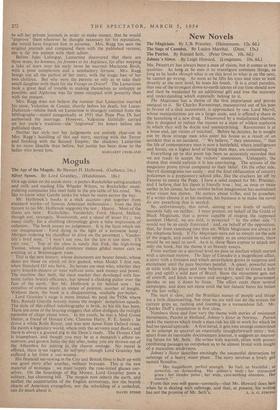New Novels
MR. PRIESTLEY has always been a man of vision, but it comes in two qualities. As long as he uses it to transfigure common things, as long as he looks through what is on this level to what is on the next, he cannot go wrong. As soon as he lifts his eyes and tries to look directly at the next level, he loses his touch. It is a cruel paradox, that one of the 'strongest down-to-earth talents of our time should now and then be weakened by an additional gift and lose the accuracy and understanding which especially belong to it.
The Magicians has a theme of the first importance and proves unequal to it. Sir Charles Ravenstreet, manoeuvred out of his post in favour of a slick accountant, is approached by one Lord Mervil, whose manipulations are on a larger scale, and is offered a share in the launching of a new drug. Discovered by a maladjusted chemist, this is designed to reduce the masses to a state .of witless euphoria in which they will be docile and unenterprising. Ravenstreet is at a loose end, apt victim of mischief. Before he decides, he is sought out by three strange men who enter his house as a result of an accident that is no accident. " We believe," they announce, " that the life of contemporary man is now a battlefield, where intelligences and forces, on a higher level of being than man, are contending."
Everything up to this point has been so accurately recorded that we are ready to accept the visitors' contention. Unhappily, the drama that would enforce it is less convincing. The actions of the magicians prove trivial compared to their belief. On the other side, Mervil disintegrates too easily : and the final obfuscation of country policemen is a preparatory school joke, like the crackers let off by Faustus to annoy the Pope. I have a solid respect for Mr. Priestley, and I believe, that his thesis is literally true ; but, as once or twice earlier in his career, he has written before imagination has assimilated what vision has shown. He natters about trifles, and he preaches. if a writer choose it as his medium, his business is to make the novel do any preaching that is needed.
So, unfortunately, this novel, aiming at two levels of reality, succeeds fully on neither. I must protest, on behalf of the Guild of Black Magicians, that a power capable of staging the supposed accident (Mervil, we are told, is protected " by the other side ") would not be so easily frustrated : and, on behalf of the opposition, that, far from vanishing into thin air, White Magicians are always in the telephone book. If The Magicians were not so stoutly on the side of the angels, and could be taken simply as an entertainment, there would be no need to cavil. As it is, these flaws expose to attack not only the book, •but the theme it so bravely essays.
From warfare on a spiritual level we pass to warfare which started with a spiritual motive. The Sage of Canudos is a magnificent affair, a story with a foreseen end which nevertheless grows in suspense and excitement until the pace becomes painful. A queer, powerful man at odds with his place and, time believes it his duty to found a holy city and uplift a wild part of Brazil. Soon the movement gets out of contrdl, and leads to excess and savagery, until the government decides to put it down by force. The effort costs them several campaigns, and does not cease until the last fanatic bares his breast 'to the last volley.
The start is slow, and the Brazilian names of people and things are a little disconcerting, but once we are well out on the stream the current grips us, rushing and foaming to a tremendous fall. Mr. Charles Duff's translation is first class.
Numbers three and four vary the theme with stories of resistance movements, Patriot in Holland, Johnny's Sister in Norway. Patriot seeks the motives which made a man risk his life in work for which he had no special aptitude. A first novel, it gets into strange contortions in its attempt to unravel an essentially straightforward story : but, apart from its inevitable documentary interest, it suggests an interest- ing future for Mr. Seth. He writes with warmth, often with power, combining passages so outspoken as to be almost brutal with insight of a masculine tenderness.
Johnny's Sister describes excitingly the successful destruction by sabotage of a heavy water plant. The story involves a lovely girl named Synnove.
" Het magnificent, perfect strength. So frail, so beautiful ; so powerful, so demanding. Her athlete's body ; her statuesque grace ; her slender poise ; her wide, care-nothing abandon. Her mastery."
From this you will guess—correctly—that Mr. Howard does best when he is dealing with sabotage, and that, at present, his writing
has not the promise of Mr. Seth's. L. A. G. STRONG


































 Previous page
Previous page